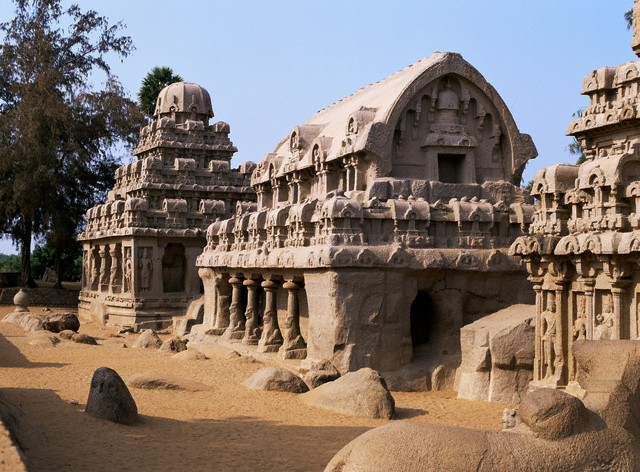Ancient IndiaCalenderImportant Links |
INDIAN GLOSSARY
The Land and Its People
Harappa
The Aryans
The Conquest of Alexander
The Moryans 321 - 185 BC
The Age of Guptas And After
The Pre-Vedic Age
The Vedas
The Vedantic Age
The Reaction and Rebellion: Jainism & Buddhism
During the Axial Age, enlightened thinkers, throughout the known world, were developing new explanations of existence, and man's place within the order of the universe. In India, the Upanishads redefined the Aryan religious tradition. Led by ksatriya ascetics, this new development rebelled against the ritual superiority of the brahman class proliferated during the Vedic period. This movement gradually led to an integral transformation of Hindu thought. But, while these new thinkers quietly transmuted the Aryan belief system, two other luminaries, not only challenged the ritualism of the former tradition, but openly rejected the rigidity of class distinction, forming new religions. Similar to the seekers, who reformed Hinduistic thought, the individuals responsible for the growth of these new religions came from the ksatryia caste that sought a release from the brahman's domination of ritual. Also significant, in this quest for change, were the members of the vaishya caste. With the collapse of tribalism, India experienced great material and economic growth from which this class, which included an increasing number of merchants, craftsmen, and professional, benefited. Many of the vaishya, therefore, resented the privileges afforded the upper two castes, which invariably prepared them for religious ferment. Most prominent of the two individuals seeking answers to the orthodox Vedism, and the injustice of the caste system was Siddhartha Gautama(c. 563 BC-483 BC) who founded the religion known as Buddhism. Although this tradition significantly diminished in the land of its birth, it remained a powerful force in the rest of the world. Central to Buddhist thought are the Four Noble Truths: that all life is suffering (dukkha); the cause of suffering is desire; escape from dukkha can be attained by ending desire; the path to the cessation of desire can be achieved through the Noble Eight-Fold Path comprised by right views, motives, speech, conduct, livelihood, effort, thought and meditation. Although Buddhism became more important because of its spread outside of India, Jainism, at least within the confines of the subcontinent, gathered equal support. Western scholars frequently list Vardhamana Mahavira (c. 540 BC- 468 BC), as the founder of Jainism. According to Jain legend, however, Mahavira was the last in line of twenty-four Tirthankaras, or those who had successfully crossed the river of suffering and attained enlightenment. Like Siddhartha Gautama, Mahavira came from the ksatriya caste, and eventually abandoned his family and earthly possessions to become a wandering ascetic in search of spiritual enlightenment. After an extended period of meditation, Mahavira attained full enlightenment and became a kevalin (completed soul), and a jina (conqueror). Mahavira continued his teachings for a number of years accompanied by a band of naked monks. Purportedly he died at the age of seventy-two as a result of starvation. The codification of Jain religious doctrines did not occur until nearly two hundred years after Mahavira's death, but contained many of his teachings. According to Mahavira, all living things are divided into five categories and are delineated by the number of senses they posses. The highest class, which have five senses include men, gods, and animals with higher intelligence. The second class, with four senses (touch, smell, taste, and sight), include most larger insects. The third classification, supposedly devoid of sight, contains smaller insects such as fleas and ants. Included in the second group, with only touch and taste, are worms, some shellfish, and leeches. The final class of one sensed creatures, not only includes plants, but such inanimate objects such as minerals, fire, and water. In this respect, then, everything in nature contains karmic matter, and karma is the cause of bondage. Thusly, all Jains are instructed to respect all things unconditionally, and to practice ahimsa, or nonviolence, towards all things. Salvation, or enlightenment, according to Jain principles, can only be attained by freeing one's soul from karmic matter to reach a level of purity. |

